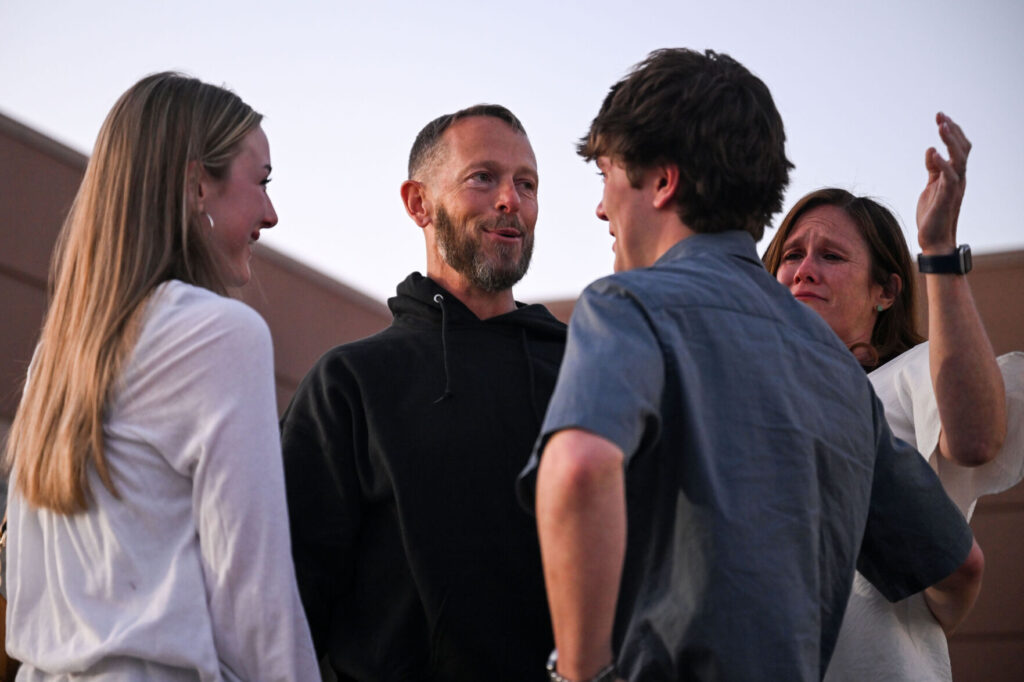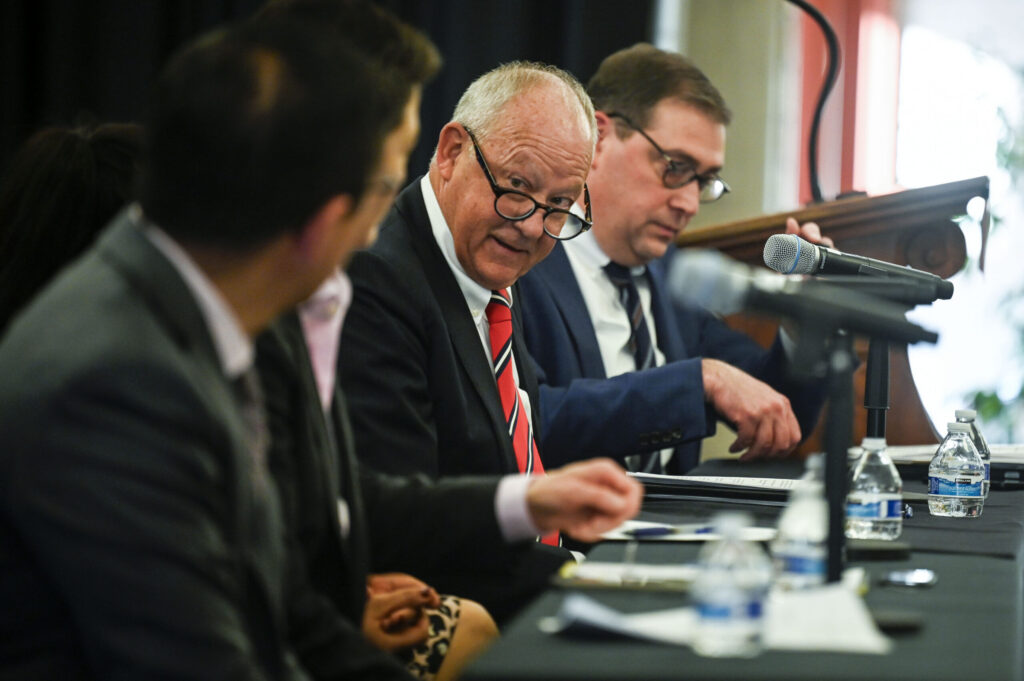Q&A with Anne Mangiardi | New judicial discipline director shares plans for change
In July, Anne Mangiardi took over as the new executive director of the Colorado Commission on Judicial Discipline.
Mangiardi, who previously worked in the Colorado Attorney General’s Office, succeeds Christopher Gregory, who the commission placed on leave early this year.
The commission features a mixture of judges, lawyers and non-attorneys whose role includes investigating allegations of judicial misconduct, known as “requests for evaluation.” Although the commission may discipline a judge privately, more serious proceedings that may require public censure or removal of a judge culminate in the state Supreme Court.
Next month, voters will decide whether to enact constitutional Amendment H, referred by the legislature last year to address judicial discipline. Broadly, the amendment would restructure the judicial discipline framework to shrink the Supreme Court’s role to that of an appellate body and would provide slightly more transparency around disciplinary proceedings.
Mangiardi spoke to Colorado Politics about her first few months in the job and her ideas for the role.

The Ralph L. Carr Colorado Judicial Center, on Tuesday, Sept. 13, 2022, in Denver, Colo. (Timothy Hurst/The Denver Gazette)
Colorado Politics: You were at the attorney general’s office before this. How would you draw the line from there and from your prior career to this unique role?
Anne Mangiardi: I was at the AG’s office for about seven years and my primary role there was tax — litigating tax cases, advice around TABOR — completely unrelated to what I’m doing now. At that role, I would occasionally take on one-off projects. A couple of those projects related to state agencies that were facing an investigation, like the Department of Justice, or who had decided to get outside counsel to do an investigation into themselves.
So, I was brought on to work on and supervise a few of those and it got me interested in this question of how do you do an investigation? How do you do it well? How do you increase public confidence?
When I saw this position come up, it really dovetailed with that experience.
CP: Can you talk about your investigative experience in general?
Mangiardi: My experience was overseeing outside counsel who was doing the investigation. Making sure they were doing their work appropriately and billing appropriately — an oversight role. But it helped me see what they were doing day to day, who they were talking to, how the process went, for me to develop my own thoughts about how to do that work.
CP: Broadly, what was your understanding of the judicial discipline commission before you took the job? Did you have any opinions on how well they were doing at their job?
Mangiardi: I had been following for a long time the news reports regarding (the judicial branch). And of course, the discipline commission came up. It was really an outsider’s view, so I don’t know that I have a view on whether the commission was doing their job well or poorly. But I think a lot of attorneys are not particularly aware of who we are or what we do. So, I’ve had an opportunity to learn about how this all works. Just as an attorney practicing in Colorado, I was vaguely aware of the commission, but not a lot of detail.

Colorado Supreme Court Chief Justice Brian D. Boatright gives opening remarks during a swearing-in ceremony for the first-ever class of licensed legal paraprofessionals, a newly authorized occupation allowed to practice law to a limited extent. The LLPs took an oath of office in the Colorado Supreme Court’s courtroom on Thursday, June 20, 2024. (Stephen Swofford, Denver Gazette)
CP: What’s the most surprising thing you’ve learned about how the commission operates or what its mission is?
Mangiardi: The most surprising thing to me is when I first started at the AG’s office — before that, I hadn’t realized how much of state government is enacted by independent boards and commissions, most of whom are staffed by volunteers. So, I had this awareness for a few years that this is really common and I had this question in the back of my mind about how could this possibly work in practice?
I’ve been really heartened to see the commission in practice — to see how conscientious they are, how much time they are putting into this given how busy they are with their regular lives and how thoughtful they are. It’s given me a sense that it does work to have independent commissions of volunteers doing roles like this.
CP: Before you joined the judicial discipline commission or since, have you had an opportunity to look at how other states handle judicial discipline?
Mangiardi: Yeah. There is an annual conference — an organization of these various state organizations — and it happened to be the first week I started. My fourth day on the job, I was in D.C. meeting a bunch of directors from other states.
There’s a lot of similarities between how other states work. It was interesting to see some of the range. Some states have one person and that’s it. Other states have significant staffs. We’re kind of in the middle — we have three. But it is nice to know there are other people looking at issues in these states and they’re a great resource that I can talk to when I have questions.
CP: Either from that interaction or from your ideas having applied for the commission, is there anything you plan to do to change how things operate, to the extent you can change things unilaterally?
Mangiardi: One thing that’s always been part of our constitutional mission but hasn’t been at the forefront of the commission’s actions for the last few years has been education. We have a statutory mission to educate judges and the public. I think we want to put a lot more emphasis on that in the next year or two.
On the judge side, that will mean presenting some continuing education classes for judges. On the individual side, I think maybe how that will play out is our website currently is not aimed at helping somebody who isn’t already familiar with the judicial system understand what we do and how the commission works and what happens when they send a request for evaluation to us. So, I think we want to do some work to be more public facing and helpful when the public has questions for us.
CP: I assume those RFEs are the primary interaction you have with the public, but do people call or write to you just to find out more about judicial discipline apart from specific complaints?
Mangiardi: They call a lot. Oftentimes, it’s someone who is gonna want to make an RFE and they want to know more about the process ahead of time. The most frequent question is someone who is concerned about their private information and they want to make sure their complaint will continue to be confidential. So, we can provide some more information about that. But we do have people who write or call in who are just wondering what is this and what happens?

FILE PHOTO: A gavel sits on a desk inside the Court of Appeals at the Ralph L. Carr Colorado Judicial Center in Denver.
CP: Do you have any plans to be more personally visible to Coloradans in this job? Or do you not see that as your role?
Mangiardi: Yes and no. I think the website is kind of the first step in being more helpful to the public with questions about how we work. And it may be there will some good opportunities to be more public-facing as that evolves. I certainly do want to reach out more to the bar because attorneys are the ones who see judges in action most often. They are most in a position to see issues and to raise them. But I think that’s farther down the line.
There are some good statistics in the annual report that don’t otherwise live on the website. In particular, trying to get statistics out of the text and into some graphics so that they’re easier to understand, more accessible for folks who have different learning styles, for example.
CP: With the constitutional amendment that’s on the ballot this fall, what does the commission want people to know before they cast their vote for or against?
Mangiardi: I think the way that I would phrase it is that I and the commission are really interested and excited to see what the public decides about Amendment H. There will be some changes if Amendment H is passed and we’ll be ready and willing to start implementing those. But really, I think we trust the voters. I think it is appropriate and a good thing that it is a decision for the voters to make. I don’t think it’s something I personally need to be weighing in on.
CP: If the amendment does not pass, is it status quo for you all?
Mangiardi: It would be status quo.
CP: The legislative session will start in three months. You will presumably speak at the SMART Act hearing for the judiciary committees. What do you anticipate they will want to know and you will want to tell them?
Mangiardi: I think the real message here is that the commission is in a good place and working well. We don’t need a new budget or new initiatives. We just need to continue doing the work. I’m new to the role. Some of the commissioners are relatively new to their roles. I think everything needs a little bit of time to keep running. Obviously, if Amendment H passes, we’ll have started to implement that. But at this point, what I’m seeing at the commission is really positive.
CP: What are your thoughts about information sharing? Do you think more information needs to come from judicial discipline to the performance commissions and to the legislature, and vice versa, about inquiries into judge behavior?
Mangiardi: Our confidentiality rules are set by constitution. This is something for the people to weigh in on. If Amendment H passes, that would change things somewhat. Certain things would become public earlier, that’s when we have formal discipline.
What I hear from the public when they write in about filing an RFE is that individuals are really concerned about their private information and what is going to happen when they report something to us. I think it’s important we continue to be really protective of that and to balance that against the need for transparency. I think it’s really for the public to decide if they want to change that balance with Amendment H or keep it status quo.











